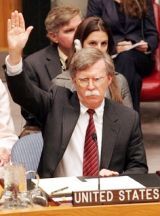Sudan rejects UN resolution on Darfur peacekeepers
Aug 31, 2006 (KHARTOUM) — Sudan on Thursday rejected a U.N. resolution giving the world body authority over peacekeepers in the war-torn region of Darfur on condition that the government in Khartoum gives its consent.
 Sudanese President Omar Al-Bashir chaired a meeting of the ruling National Congress party leadership which rejected the resolution passed by the Security Council earlier Thursday, the SUNA official news agency said.
Sudanese President Omar Al-Bashir chaired a meeting of the ruling National Congress party leadership which rejected the resolution passed by the Security Council earlier Thursday, the SUNA official news agency said.
“The Sudanese people will not consent to any resolution that will violate its sovereignty,” the leadership said in a statement, quoted by the agency.
The ruling party’s leadership said it regarded the approval of the resolution as “unjustifiable hostility against Sudan.” It called on the Sudanese people to “strengthen further their cohesion and ranks and prepare to face any development.”
The resolution is meant to give more power and funding to a 7,000-strong force, now run by the African Union, that has been unable to stop the humanitarian catastrophe in the western Sudanese region of Darfur Darfur that has killed more than 200,000 people and continues to worsen.
The document passed 12-0, with China, Russia and Qatar abstaining.
Yet the council cannot take any significant action on the resolution until Sudan reverses its opposition to the proposed U.N. force of more than 20,000 military and police.
The United States and Britain, the two original sponsors of the resolution, said they hoped that the vote would help put new pressure on Sudan’s president to acquiesce.
More than 2 million been displaced in Darfur since 2003 when ethnic African tribes revolted against the Arab-led Khartoum government. The government is accused of unleashing Arab militiamen known as janjaweed who have been blamed for widespread atrocities.
A peace deal signed by the government and one of the ethnic African rebel groups operating in the region has had little effect.
U.N. officials and aid workers say the crisis has only deepened in recent months, with rape, killings and other attacks in Darfur at a new high.
(AP/ST)
